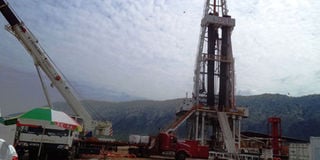Contamination delays oil exploration in Ntoroko

An oil exploration site in Kaiso-Tonya in Hoima District. Photo by Francis Tusiime
What you need to know:
Oil exploration. Energy and Mineral Development ministry spokesperson says only 40 per cent of oil exploration areas, all in the Albertine Graben, have been covered
NTOROKO.
The presence of hydrocarbons mixed with carbondioxide has stalled oil exploration in Ntoroko District.
“Carbondioxide causes explosion and is flammable and when the Ministry (Energy and Mineral Development) is not well prepared, it may cause fire explosions in Ntoroko and this calls for more preparations,” Mr Bukenya Matovu, the head of communications at the Ministry of Energy and Mineral Development, told Kabarole District executive committee on Thursday.
He said the ministry will license more companies to carry out oil exploration in Ntoroko and other districts within the Albertine region.
Mr Bukenya said only 40 per cent of exploration areas have been covered by the government and they are in Hoima, Nwoya and Buliisa all in the Albertine region.
“About 21 production fields have been worked on out of the anticipated 114 in Bunyoro sub-region and they have been fully tested,” he said.
Mr Bukenya said 6.5 billion barrels of oil have been discovered but only 1.7 billion are recoverable or extractable.
He added that more oil discoveries are expected but currently only 40 per cent of it can be recovered from underground because of the weak technology. He said if advanced technology is applied, there will be more recoverable oil reserves.
He said government granted CNNOC, Total and Tullow exploration rights but only CNOOC has been given production licence.
“Production licence is where the country’s money lies and this requires a lot of experts to engage the company. This has delayed the government to give more licences to other companies,” said Bukenya.
He said oil production has been further delayed by the lack of a pipeline, cleaning factory and a refinery in Uganda.
He said government is sorting out compensation issues with the affected people on whose land the oil refinery will be constructed. He said the refinery is expected to produce 30,000 barrels of oil per day in the first phase, 60,000 in the subsequent phase and 120, 000 in the last phase.
The first production of usable oil is set to start in 2018.




